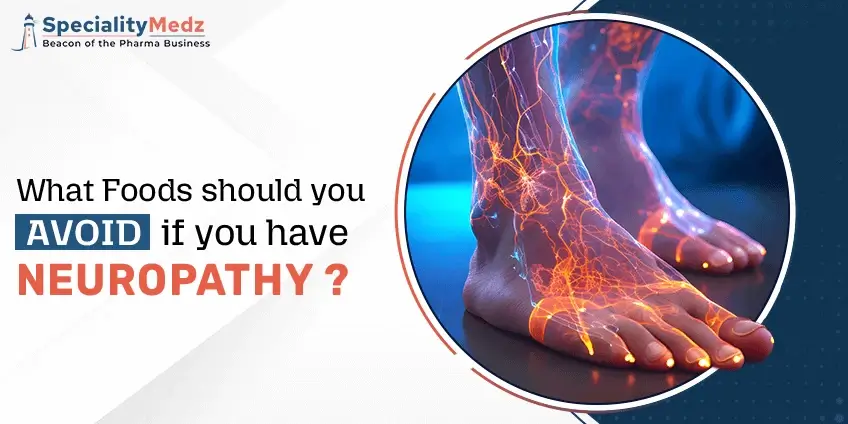Neuropathy affects millions worldwide. Treating this condition is a holistic method that includes good medications and dietary changes. For wholesale and pharmacy suppliers who understand the dietary connection, it provides a base for recommending complete patient care solutions in addition to products such as Gabapentin and special formulas.
What is neuropathy?
Peripheral neuropathy is damage to the peripheral nervous system. This disorder involves nerves outside the brain and spinal cord. Common symptoms include:
- Burning pain
- Tingling and burning sensations in the hands and feet
- Muscle weakness
- Sharp, shooting pains
The most typical type is diabetic neuropathy. Other contributing factors include chemotherapy, vitamin deficiencies, and autoimmune diseases. For treatment, patients are usually prescribed drugs like Gabapentin, which is used to help manage nerve pain. Healthcare professionals generally prescribe Gabatop 100 for mild cases of symptoms. It is also available in different strengths, such as Gabasign 800.
How does neuropathy affect your diet?
Functional status in the presence of neuropathy makes nutrition a multidimensional relationship. A bad diet can further aggravate the nerve damage. Some foods cause inflammation and raise oxidative stress. This is further damaging to already compromised nerves.
Diabetic neuropathy patients suffer abnormal changes in blood sugar that impact them severely. There is injury to the nerve fibers, and that reaction occurs over time. The stabilization of blood sugar becomes important when managing symptoms.
Inflammation markers go up with some foods. This inflammation inhibits nerve regeneration. Patients require dietary consultations in addition to medications if they are to achieve maximum benefits.
What foods should you avoid if you have neuropathy?
High-Sugar Foods
Processed sugars trigger dangerous escalations in blood sugar levels. If you have diabetic neuropathy, avoid these foods:
- Sweets and chocolates
- Carbonated beverages and fruit juices
- Pastries and cakes
- Ice cream and dessert
Processed Foods
Ultra-processed items contain harmful additives. These chemicals increase inflammation:
- Fast food meals
- Packaged snacks
- Frozen dinners
- Processed meats
Refined Carbohydrates
Blood sugar spikes quickly from white flour products:
- White bread and pasta
- White rice
- Crackers and chips
- Breakfast cereals
Trans Fats and Saturated Fats
These fats cause inflammation and damage nerves:
- Fried foods
- Margarine and shortening
- Packaged baked foods
- High-fat dairy products
Excessive Alcohol
Alcohol damages nerves directly. It also drains the crucial B vitamins required for healthy nerves. Cut down on alcohol or give it up altogether.
High-Sodium Foods
Excess sodium affects circulation. Neuropathy symptoms are aggravated by poor blood flow:
- Canned soups
- Deli meats
- Pickled foods
- Restaurant meals
Why these foods are problematic?
These are the foods that cause many issues for patients with neuropathy. High levels of sugar also damage nerve cells through glycation. This process generates toxic compounds that attack nerve fibers.
Inflammatory foods increase cytokine production. It aggravates nerve pain and slows healing. And if you are using Gabapentin or Gabatop 100, these foods have effects that stop them from working as well as they should.
The nerve can’t get through, and the delivery of nutrients to nerves is impaired by poor circulation from these high-sodium foods. Diseased nerves need appropriate nutritional support to heal. Less blood circulating in the region, and therefore, less of this natural healing.
Trans fats alter cell membrane composition. This affects nerve signal transmission. Those patients taking Gabasign 800 may even have trouble controlling symptoms with this bad fat.
Best food options for neuropathy
Focus on anti-inflammatory, nutrient-dense foods:
Omega-3-Rich Foods
- Fatty fish (such as salmon and mackerel)
- Walnuts and flaxseeds
- Chia seeds
Antioxidant-Rich Vegetables
- Leafy greens
- Colorful, sweet bell peppers
- Berry fruits and cherries
B-Vitamin Sources
- Lean poultry
- Eggs
- Legumes and beans
Complex Carbohydrates
- Quinoa and brown rice
- Sweet potatoes
- Oats
These are nerve-friendly foods, which make the medicine work better. Patients usually have improved symptom management when they can add good nutrition to their formal medications available from Specialitymedz.com.
Conclusion
Eliminating problem foods avoids inflammation and damage to the nerves. This method is designed to improve the bioavailability of drugs such as Gabapentin preparations.
Pharmacy suppliers need to inform outlet clients in this regard of these dietary associations. Whole patient care is medication and lifestyle modification. This method enhances the efficacy of treatment and patient satisfaction.
Patients prescribed Gabatop 100 or Gabasign 800 by their medical professionals should engage in a dietary regimen. This whole-body approach gets better results for neuropathy sufferers all over the globe.
FAQs
Does diet make neuropathy worse?
Yes, certain foods can make neuropathy symptoms much worse. For example, high-sugar foods, processed foods, refined sugars, and Trans fats are best avoided for the optimal health of your nerves.
How can my diet affect neuropathy?
Neuropathy is influenced by diet via a variety of pathways. Bad eating habits elevate the inflammation and increase oxidative processes. These processes injure nerve cells and intensify symptoms. Proper nutrition is beneficial to repair the nerves and assist with medications (including Gabapentin).
Is neuropathy well-treated by nutritional supplements?
Some supplements could be beneficial for patients with neuropathy. B-complex vitamins support nerve function. Alpha-lipoic acid provides antioxidant protection. However, supplements should be used as complementary medicines and not as a substitute for medications such as Gabatop 100 or Gabasign 800. Consult medical professionals for a more tailored recommendation.

